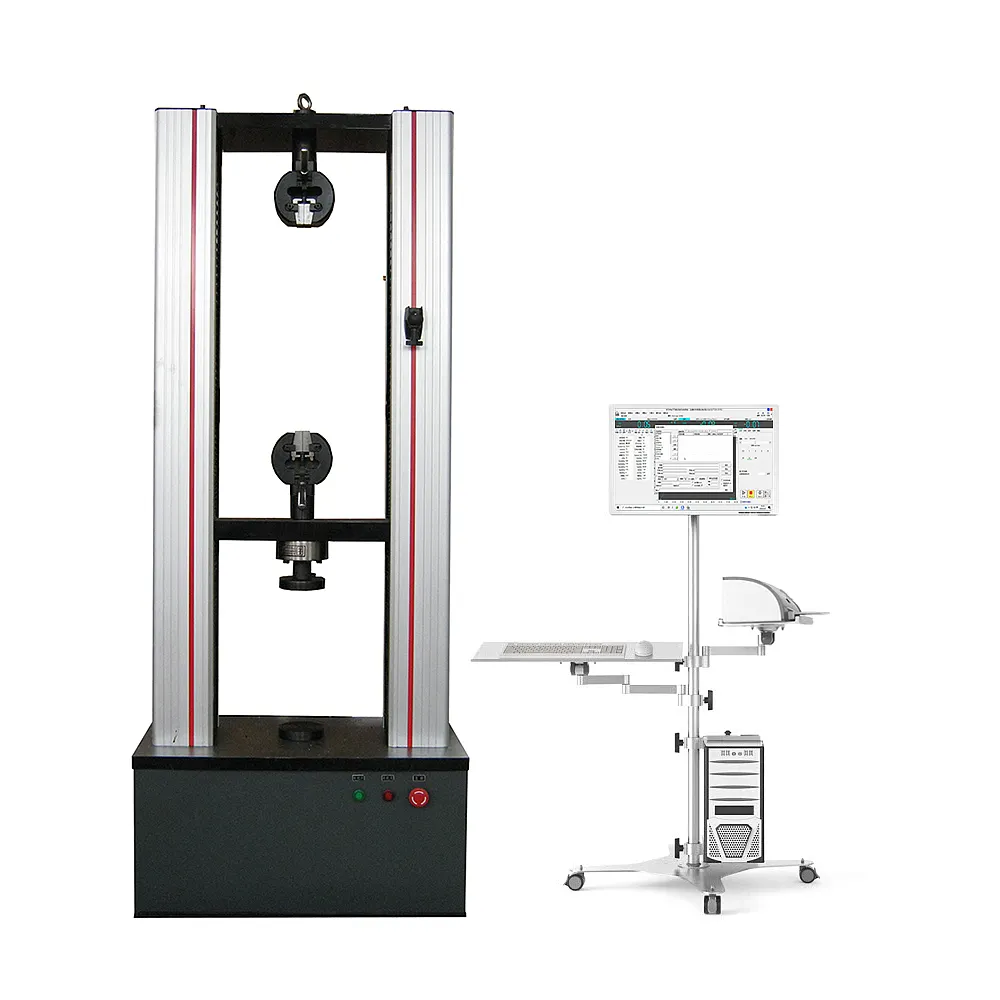Home » Posts tagged 'strength testing machine'
Tag Archives: strength testing machine
What are the typical applications or industries where strength testing machines are used?
Strength testing machines find applications in various industries and sectors where the mechanical properties and strength of materials or components need to be evaluated.
Here are some typical applications and industries where strength testing machines are used:
Manufacturing and Engineering: Strength testing machines are extensively used in the manufacturing and engineering industries to assess the strength, durability, and performance of materials, components, and finished products. This includes testing of metals, alloys, plastics, ceramics, composites, and other materials used in industries such as automotive, aerospace, construction, and consumer goods.
Quality Control and Assurance: Strength testing machines play a crucial role in quality control and assurance processes. They help ensure that materials and products meet specified standards, regulations, and customer requirements. By performing strength tests, manufacturers can identify defects, weaknesses, or inconsistencies in materials or finished products.
Research and Development: Strength testing machines are utilized in research and development activities to investigate new materials, develop improved manufacturing processes, and assess the performance of prototypes or experimental components. Researchers can study the mechanical behavior, fatigue resistance, and other characteristics of materials under different conditions.
Building and Construction: In the construction industry, strength testing machines are used to evaluate the strength and load-bearing capacity of building materials such as concrete, cement, asphalt, aggregates, and structural elements. These tests help ensure structural integrity and compliance with building codes and standards.
Pharmaceutical and Medical Devices: Strength testing machines are employed in the pharmaceutical and medical device industries to assess the mechanical strength and integrity of drug delivery systems, packaging materials, medical implants, syringes, and other components. These tests help ensure product safety and reliability.
Textile and Fabrics: Strength testing machines are utilized to measure the tensile strength, tear resistance, and other mechanical properties of textiles and fabrics. These tests are essential in the textile industry for quality control, product development, and compliance with industry standards.
Plastics and Polymers: Strength testing machines are employed in the plastics and polymer industry to evaluate the mechanical properties, including tensile strength, flexural strength, impact resistance, and elongation at break. These tests assist in material selection, product design, and quality control.
Packaging and Material Handling: Strength testing machines are used to assess the strength and integrity of packaging materials, such as plastics, cardboard, paperboard, and corrugated containers. These tests ensure that packaging can withstand transportation, storage, and handling stresses without failure.
Education and Research Institutes: Strength testing machines are essential equipment in educational institutions and research laboratories for teaching purposes, conducting experiments, and studying material properties. They help students and researchers understand the behavior of materials under different loading conditions.
Consumer Product Testing: Strength testing machines are employed to evaluate the durability and performance of various consumer products, such as furniture, appliances, electronics, toys, and sports equipment. These tests help manufacturers ensure that their products can withstand typical usage and meet safety standards.
These are just a few examples of the broad range of applications and industries where strength testing machines are used. The specific requirements and test methods vary depending on the industry and the materials being evaluated.
What are the safety precautions and guidelines to follow when operating a strength testing machine?
When operating a strength testing machine, it is crucial to follow safety precautions and guidelines to ensure the well-being of operators and the proper functioning of the equipment.
Here are some general safety precautions to consider:
Familiarize Yourself with the Machine: Read and understand the manufacturer’s operating manual and instructions before using the strength testing machine. Familiarize yourself with its components, controls, and safety features.
Personal Protective Equipment (PPE): Wear appropriate personal protective equipment, such as safety glasses, gloves, and protective clothing, strength testing machine as recommended by the manufacturer or safety guidelines.
Training and Competence: Ensure that operators are adequately trained and competent in operating the strength testing machine. Training should cover proper machine operation, understanding of testing procedures, and safety protocols.
Equipment Inspection: Regularly inspect the strength testing machine for any signs of damage, wear, or malfunction. Do not operate the machine if any abnormalities are detected. Report any issues to the relevant personnel or supervisor.
Workspace Safety: Maintain a clean and organized workspace around the strength testing machine. Keep the area free of clutter, obstructions, and trip hazards. Ensure proper lighting and ventilation in the testing area.
Load Capacity and Overloading: Adhere to the recommended load capacity of the strength testing machine. Avoid overloading the machine, as it can lead to equipment failure, accidents, or injury.
Secure Sample Fixturing: Properly secure and align the sample or specimen being tested in the testing machine. Follow the manufacturer’s instructions for sample preparation and fixturing to ensure accurate and safe testing.
Emergency Stop and Shutdown: Familiarize yourself with the emergency stop and shutdown procedures of the strength testing machine. Know the location and operation of emergency buttons or switches to immediately halt the testing process if necessary.
Safe Distance: Maintain a safe distance from the strength testing machine during operation to avoid potential injury from moving parts, sample failure, or unexpected machine behavior.
Record Keeping: Maintain accurate records of testing procedures, results, and any relevant observations. Proper documentation helps in traceability, analysis, and monitoring of the testing process.
It’s important to note that these are general safety precautions, and specific safety guidelines may vary depending on the type and model of the strength testing machine. Always refer to the manufacturer’s instructions and any applicable safety regulations or guidelines to ensure safe operation.
